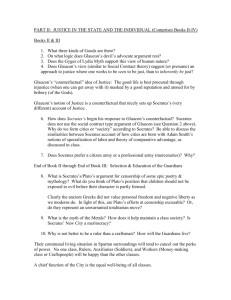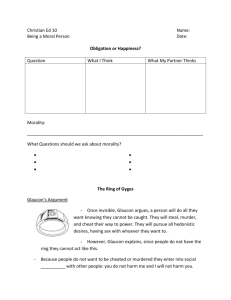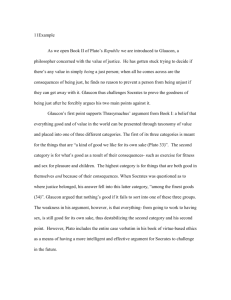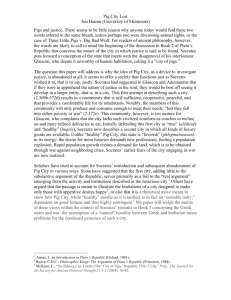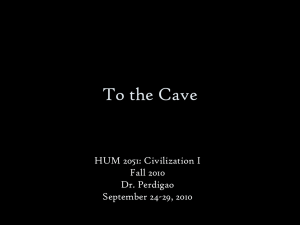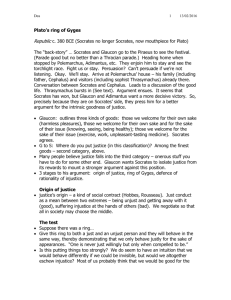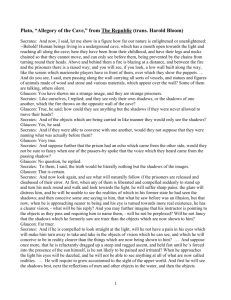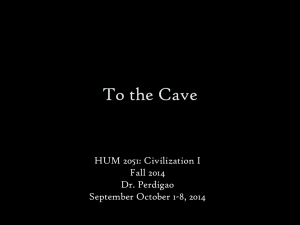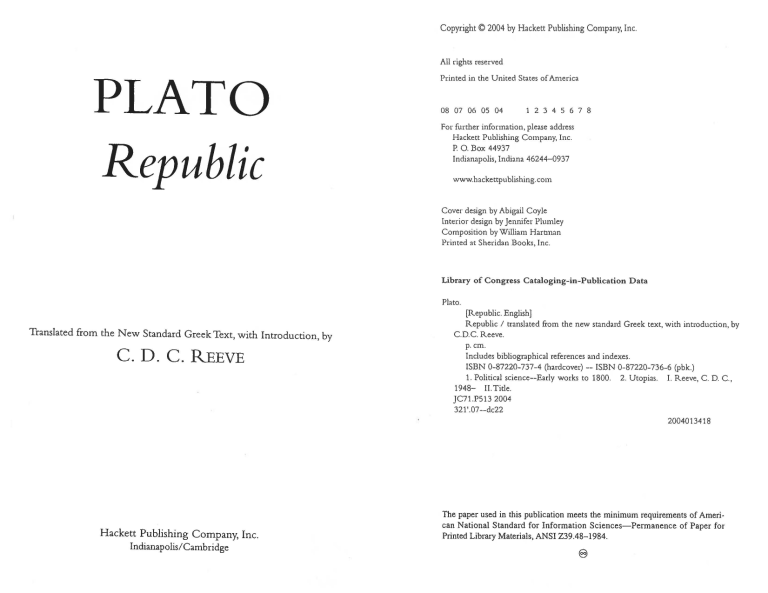
Copyright © 2004 by Hackett Publishing Company, Inc. All rights reserved PLATO Republic Printed in the United States of America 08 07 06 05 04 1 2 3 4 5 6 7 8 For further information, please address Hackett Publishing Company, Inc. P. 0. Box 44937 Indianapolis, Indiana 46244-0937 www.hackettpublishing.com Cover design by Abigail Coyle Interior design by Jennifer Plumley Composition by William Hartman Printed at Sheridan Books, Inc. Library of Congress Cataloging-in-Publication Data Plato. Translated from the New Standard Greek Text, with Introduction, by C. D. C. REEVE Hackett Publishing Company, Inc. Indianapolis/ Cambridge [Republic. English) Republic / translated from the new standard Greek text, with introduction, by C.D.C. Reeve. p.cm. Includes bibliographical references and indexes. ISBN 0-87220-737-4 (hardcover) -- ISBN 0-87220-736-6 (pbk.) 1. Political science--Early works to 1800. 2. Utopias. I. Reeve, C. D. C., 1948- II. Title. JC71.P513 2004 321'.07--dc22 2004013418 The paper used in this publication meets the minimum requirements of Ameri­ can National Standard for Information Sciences-Permanence of Paper for Printed Library Materials, ANSI 239.48-1984. they would believe that anything other than the shadow passing in front of them was speaking? Book 7 GLAUCON: I do not, by Zeus. 10 SOCRATES: All in all, then, what the prisoners would take for true reality is nothing other than the shadows of those artifacts. C GLAUCON: That's entirely inevitable. SOCRATES' NARRATION CONTINUES: SOCRATES: Next, then, compare the effect of education and that of the 514a s b lack of it on our nature to an experience like this. Imagine human beings living in an underground, cavelike dwelling, with an entrance a long way up that is open to the light and as wide as the cave itself. They have been there since childhood, with their necks and legs fettered, so that they are fixed in the same place, able to see only in front of them, because their fetter prevents them from turning their heads around. Light is provided by a fire burning far above and behind them. Between the prisoners and the fire, there is an elevated road stretching. Imagine that along this road a low wall has been built-like the screen in front of people that is provided by pup­ peteers, and above which they show their puppets. GLAUCON: l am imagining it. SOCRATES: Also imagine, then, that there are people alongside the wall c 515a carrying multifarious artifacts that project above it-statues of people and other animals, made of stone, wood, and every material. And as you would expect, some of the carriers are talking and some are silent. GLAUCON: It is a strange image you are describing, and strange prisoners. s SOCRATES: They are like us. I mean, in the first place, do you think these prisoners have ever seen anything of themselves and one another besides the shadows that the fire casts on the wall of the cave in front of them? GLAUCON: How could they, if they have to keep their heads motionless b throughout life? SOCRATES: What about the things carried along the wall? Isn't the same true where they are concerned? GLAUCON: Of course. SOCRATES: And if they could engage in discussion with one another, SOCRATES: Consider, then, what being released from their bonds and cured of their foolishness would naturally be like, if something like this should happen to them. When one was freed and suddenly compelled to stand up, turn his neck around, walk, and look up toward the light, he would be pained by doing all these things and be unable to see the things whose shadows he had seen before, because of the flashing lights. What do you think he would say if we told him that what he had seen before was silly nonsense, but that now-because he is a bit closer to what is, and is turned toward things that are more-he sees more correctly? And in particular, if we pointed to each of the things passing by and compelled him to answer what each of them is, don't you think he would be puzzled and believe that the things he saw earlier were more truly real than the ones he was being shown? GLAUCON: Much more so. SOCRATES: And if he were compelled to look at the light itself, wouldn't GLAUCON: He would. SOCRATES: And if someone dragged him by force away from there, along the rough, steep, upward path, and did not let him go until he had dragged him into the light of the sun, wouldn't he be pained and angry at being treated that way? And when he came into the light, wouldn't he have his eyes filled with sunlight and be unable to see a single one of the things now said to be truly real? SOCRATES: He would need time to get adjusted, I suppose, if he is going them? When one of the carriers passing along the wall spoke, do you think GLAUCON: Of course. 208 516a GLAUCON: No, he would not be able to-at least not right away. SOCRATES: What if their prison also had an echo from the wall facing GLAUCON: They would have to. e his eyes be pained and wouldn't he turn around and flee toward the things he is able to see, and believe that they are really clearer than the ones he is being shown? to see the things in the world above. At first, he would see shadows most easily, then images of men and other things in water, then the things them­ selves. From these, it would be easier for him to go on to look at the things in the sky and the sky itself at night, gazing at the light of the stars and the moon, than during the day, gazing at the sun and the light of the sun. don't you think they would assume that the words they used applied to the things they see passing in front of them? d 209 b SOCRATES: This image, tions of it in water or some alien place, but the sun just by itself in its own place-and be able to look at it and see what it is like. SOCRATES: What about when he reminds himself of his first dwelling place, what passed for wisdom there, and his fellow prisoners? Don't you think he would count himself happy for the change and pity the others? whole with what we said before. The realm revealed through sight should be likened to the prison dwelling, and the light of the fire inside it to the sun's power. And if you think of the upward journey and the seeing of things above as the upward journey of the soul to the intelligible realm, you won't mistake my intention-since it is what you wanted to hear about. Only the god knows whether it is true. But this is how these phenomena seem to me: in the knowable realm, the last thing to be seen is the form of the good, and it is seen only with toil and trouble. Once one has seen it, however, one must infer that it is the cause of all that is correct and beauti­ ful in anything, that in the visible realm it produces both light and its source, and that in the intelligible realm it controls and provides truth and understanding; and that anyone who is to act sensibly in private or public must see it. GLAUCON: Certainly. GLAUCON: I agree, so far as I am able. SOCRATES: And if there had been honors, praises, or prizes among them SOCRATES: Come on, then, and join me in this further thought: you for the one who was sharpest at identifying the shadows as they passed by; and was best able to remember which usually came earlier, which later, and which simultaneously; and who was thus best able to prophesize the future, do you think that our man would desire these rewards or envy those among the prisoners who were honored and held power? Or do you think he would feel with Homer that he would much prefer to "work the earth as a serf for another man, a man without possessions of his own," 1 and go through any sufferings, rather than share their beliefs and live as they do? should not be surprised that the ones who get to this point are not willing to occupy themselves with human affairs, but that, on the contrary, their souls are always eager to spend their time above . I mean, that is surely what we would expect, if indeed the image I described before is also accurate here. GLAUCON: He would have to. SOCRATES: After that, he would already be able to conclude about it that 111 c it provides the seasons and the years, governs everything in the visible world, and is in some way the cause of all the things that he and his fellows used to see. GLAUCON: That would clearly be his next step. rn d e GLAUCON: Yes, I think he would rather suffer anything than live like that. SOCRATES: Consider this too, then. If this man went back down into the s cave and sat down in his same seat, wouldn't his eyes be filled with darkness, coming suddenly out of the sun like that? GLAUCON: Certainly. 517a my dear Glaucon, must be fitted together as a SOCRATES: Finally, I suppose, he would be able to see the sun-,-not reflec­ SOCRATES: What about when someone, coming from looking at divine things, looks to the evils of human life? Do you think it is surprising that he behaves awkwardly and appears completely ridiculous, if-while his sight is still dim and he has not yet become accustomed to the darkness around him-he is compelled, either in the courts or elsewhere, to compete about the shadows of justice, or about the statues of which they are the shadows; and to dispute the way these things are understood by people who have never seen justice itself? GLAUCON: It is not surprising at all. SOCRATES: On the contrary, anyone with any sense, at any rate, would oners in recognizing the shadows, while his sight was still dim and before his eyes had recovered, and if the time required for readjustment was not short, wouldn't he provoke ridicule?Wouldn't it be said of him that he had returned from his upward journey with his eyes ruined, and that it is not worthwhile even to try to travel upward? And as for anyone who tried to free the prisoners and lead them upward, if they could somehow get their hands on him, wouldn't they kill him? remember that eyes may be confused in two ways and from two causes: when they change from the light into the darkness, or from the darkness into the light. If he kept in mind that the same applies to the soul, then when he saw a soul disturbed and unable to see something, he would not laugh absurdly. Instead, he would see whether it had come from a brighter life and was dimmed through not having yet become accustomed to the dark, or from greater ignorance into greater light and was dazzled by the increased brilliance. Then he would consider the first soul happy in its experience and life, and pity the latter. But even ifhe wanted to ridicule it, at least his ridiculing it would make him less ridiculous than ridiculing a soul that had come from the light above. 1 Odyssey 11.489-90. The shade of Achilles speaks these words to Odysseus, who is visiting Hades. Plato is likening the cave dwellers to the dead. 210 d GLAUCON: It is what we would expect. SOCRATES: Now, ifhe had to compete once again with the perpetual pris­ GLAUCON: They certainly would. b 211 518a b s GLAUCON: That's an entirely reasonable claim. SOCRATES: Then here is how we must think about these matters, if that is true: education is not what some people boastfully declare it to be. They presumably say they can put knowledge into souls that lack it, as if they could put sight into blind eyes. c GLAUCON: Yes, they do say that. SOCRATES: But here is what our present account shows about this power to rn d learn that is present in everyone's soul, and the instrument with which each of us learns: just as an eye cannot be turned around from darkness to light except by turning the whole body, so this instrument must be turned around from what-comes-to-be together with the whole soul, until it is able to bear to look at what is and at the brightest thing that is-the one we call the good. Isn't that right? GLAUCON: Yes. SOCRATES: Of this very thing, then, there would be a craft-namely, of this turning around-concerned with how this instrument can be most easily and effectively turned around, not of putting sight into it. On the contrary, it takes for granted that sight is there, though not turned in the right way or looking where it should look, and contrives to redirect it appropriately. GLAUCON: That's probably right. • • •
